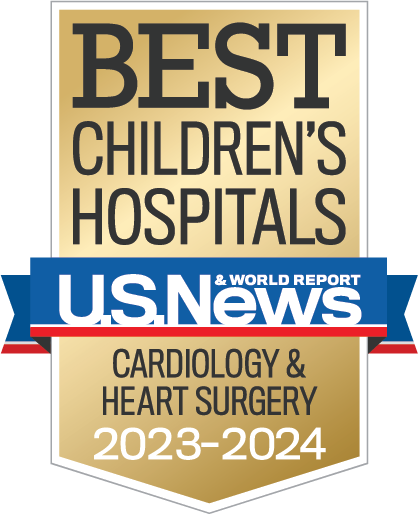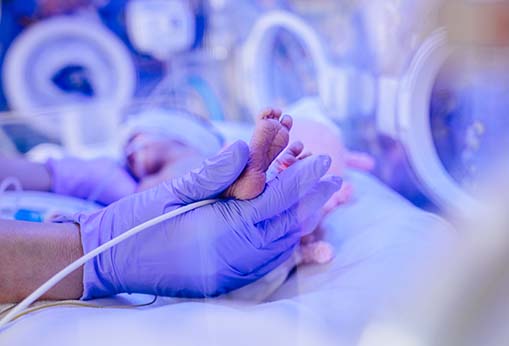Overview
Rady Children’s Division of Cardiovascular Surgery, part of the Heart Institute, performs surgeries exclusively for the treatment of congenital heart defects. Our outcomes are among the best in the nation, and we are unwavering in our dedication to improving the lives of children, adolescents and adults.
 Complemented by leading programs in pediatric electrophysiology, interventional cardiology, prenatal/pediatric cardiac diagnostics and affiliated high-risk obstetrics, the Division provides an integrated approach to the treatment of the full spectrum of complex congenital heart problems in newborns to adults.
Complemented by leading programs in pediatric electrophysiology, interventional cardiology, prenatal/pediatric cardiac diagnostics and affiliated high-risk obstetrics, the Division provides an integrated approach to the treatment of the full spectrum of complex congenital heart problems in newborns to adults.
Our highly skilled pediatric cardiothoracic surgeons use advanced surgical strategies and techniques – including hybrid procedures – to achieve optimal outcomes and to make the surgery as safe as possible.
Areas of expertise include:
- Surgical treatment of complex newborn heart defects, such as hypoplastic left heart syndrome
- Heart transplant surgery for children with symptoms of heart failure. Our Heart Transplant Center is ranked among the nation’s best health transplant programs.
- Complex reconstructive surgery in previously operated on children or adults
- Integration of catheter-based therapies with surgery to reduce risk
- Integration of advanced electrophysiologic testing, arrhythmia ablation and surgery
- Minimally invasive and cosmetic approaches to open heart surgery, when appropriate
In addition to our pediatric cardiothoracic surgeons, we also have a state-of-the-art Cardiothoracic ICU (CTICU), which brings a new level of care for cardiac and cardiovascular surgery patients requiring specialized services.
Along with providing expert surgical care, we participate in evidence-based research through Rady Children’s Heart Institute. Through this research, we seek to advance the field of pediatric cardiovascular surgery.
Why Choose Rady Children’s?
- First in San Diego to have a 3-D Heart Modeling Program.
- Successfully performed Rady Children’s first heart transplant on Jan. 14, 2015. Read more.
- Participates in multiple clinical and basic research projects designed to evaluate and treat complex forms of congenital heart disease.
- Named a California Children’s Services (CCS)-designated Center of Excellence, based on meeting strict quality outcomes criteria.
Heart Transplant Center
Rady Children’s Heart Transplant Center is ranked among the nation’s best health transplant programs. Our healthcare professionals have developed a program that can provide heart transplants for every patient with congenital heart disease, from infancy through adulthood. At our heart transplant program your child will receive expert care from a highly skilled and experienced heart transplant team.
The center’s excellent outcomes for heart transplant recipients from healthcare professionals have made us a leading referral center for the entire Southern California region, as well as parts of Arizona, Hawaii and the South Pacific.
Because of our heart transplant team of medical professionals and services, we are also a California Children’s Services (CCS)-designated Center of Excellence, based on meeting strict quality outcomes criteria. CCS is a state program for children with certain diseases or health problems for children up to 21 years old.
Expert care and heart transplantation from our health professionals may be an option for your child if he or she has symptoms of heart failure from cardiomyopathy, congenital heart disease or life-threatening abnormal heart rhythms. Medical professionals from our Pediatric Heart Failure and Transplant Program will carefully and thoroughly evaluate your child to see if he or she is a suitable candidate for a transplant. If your child is deemed a suitable heart transplant candidate, the process can begin by preparing your child for the procedure. Learn about heart transplant surgery.
Inpatient Care: Cardiothoracic ICU (CTICU)

The 30-bed Cardiothoracic ICU (CTICU) of Rady Children’s Heart Institute provides cardiac inpatient care for people of all ages (from newborns to adults) with congenital or acquired heart disease. It is a unique space within the Hospital solely devoted to all levels of inpatient cardiac care, from admission to discharge, with a focus on family-centered care.
In order to meet the needs of all patients, the unit consists of two components: a CTICU and a cardiac step-down unit (CSU). Staffed by critical care cardiac physicians, advanced practitioners, and nurses, 24 hours a day, the CTICU cares for cardiology and cardiovascular surgery patients when they are most critically ill. Many patients are admitted to the unit within hours of being born. The CTICU also cares for patients with heart failure, heart transplants, and those requiring assist devices. As patients recover from their critical illness, they progress to the CSU, where their care is continued under the supervision of cardiologists and cardiology advanced practitioners until they are ready to be discharged home.
Newborn infants with heart disease may also be cared for under the close supervision of neonatologists, who are experts in the care of infants, in collaboration with the cardiac team. All 30 beds in the CTICU are capable of functioning as a CTICU-level bed or CSU bed, assuring an appropriate level of care based on the needs of the patient. To ensure continuity of care, the teams that care for patients before their procedures continue to care for them in the unit afterward. Since these teams care for all cardiac patients admitted to the unit, patients who return to the Hospital for subsequent procedures will recognize the doctors and nurses.
A full range of cardiac services and critical care services are provided, including:
- Intensive patient monitoring
- Lab testing
- Radiology exams and cardiac imaging
- Ventilation, invasive and non-invasive
- Renal replacement therapies, including peritoneal and hemodialysis
- Advanced life support therapies, including ECMO (extracorporeal membrane oxygenation), an advanced technology that circulates blood so that oxygen can be supplied to the body when the heart or lungs are not working
Patients also receive dietary services, social services, and child life services.
The state-of-the-art unit was created to care for the growing number of cardiac patients requiring specialized services and advanced technology. Our renowned Cardiovascular Surgery team performs about 400-500 operations each year. For information on all of our Critical Care services, click here.
Cardiothoracic ICU (CTICU) Contact Info:
Rady Children’s Hospital-San Diego
Rose Pavilion, 3rd Floor (South)
3020 Children’s Way
San Diego, CA 92123
Phone: 858-966-5852
Fax: 858-966-8566